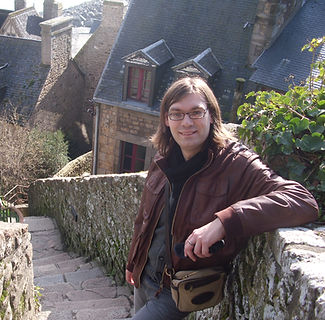

Current Position:
Assistant Professor (Chargé de Cours),
Service de Physique Théorique
Université Libre de Bruxelles (ULB)
Boulevard du Triomphe, CP225, Brussels, Belgium
Summary of my research activities in Cosmology
The increasingly accurate measurements of the anisotropies in the Cosmic Microwave Background (CMB), the observations of Type Ia supernovae and Large Scale Structures (LSS) provide firm foundations to the standard cosmological model. Its main ingredients are the cold dark matter (DM) and the dark energy (DE) (or a cosmological constant), whose origins still have to be understood. The model also requires Gaussian and nearly scale-invariant initial density fluctuations, e.g. provided by an early phase of cosmic inflation.
My first topic of research, initiated during my DEA and PhD, concerns the multi-field dynamics of hybrid inflation models and their confrontation to the most recent observations. Hybrid models are theoretically well-motivated and appear in various high-energy frameworks like supersymmetry, supergravity, string theory, grand unified and extra-dimensional theories. After my PhD, I started to explore a second research direction: Modified Gravity (MG) models (such as f(R), chameleons, dilatons, symmetrons, K-mouflage) that are well motivated candidates to DE. My work particularly focused on their modified perturbation dynamics, and on their signatures in cosmology, astrophysics, in the solar system and laboratory experiments. I have also developed an expertise in the field of 21-cm cosmology, with the calculation of forecasts on cosmological parameters, on the neutrinos mass, on modified gravity and DM, for the future generation of giant radio-telescopes.
Since 2015, one of my favourite research directions is the study of primordial black holes (PBH) as a dark matter candidate. A field that is receiving a lot of attention since the detection of gravitational waves (GW) by LIGO/Virgo. In March 2016, I was author of one of the three papers suggesting that LIGO black hole progenitors might have a primordial origin, and finding that their merging rate is consistent with a PBH abundance comparable to DM. Beyond explaining DM, PBH could help to resolve long-standing astrophysical puzzles such as the too-big-to-fail, core/cusp and hierarchy problems, or the seeds of super-massive black holes. Finally, I am interested by lattice simulations based on numerical relativity for cosmological problems. I have developed the ICARUS code, which is now used to study the back-reactions during the LSS formation and in the inhomogeneous pre-inflation era.
I am active in several working groups (WG) of the Euclid consortium. I committed to the development, validation and use of codes for the statistical forecasts and data analysis with Markov-Chain-Monte-Carlo (MCMC). I am also involved in WG on DM, DE and Modified Gravity, non-linearities, initial conditions and likelihoods. Since 2016, I am member of the Cosmology Science WG of the Square Kilometre Array (SKA). I am developing SKA forecasting codes for standard and extended cosmological models, and to explore Euclid and SKA synergies. In 2016, I have been very active in the inflation WG of COrE (CMB mission), unfortunately rejected by ESA. I am also member of LISA (GW interferometer in space) and coordinator of two PBH-related projects in the Cosmology WG. Finally, I am member of the LIGO/Virgo collaboration since 07/2018, and of the Einstein Telescope (ET), a project of GW detector that could be located at the Dutch-German-Belgium border.
Rather than looking for a leadership position, I tried to position myself as a link between these collaborations and WG (so far as I know, I am the only researcher involved in these six collaborations). I developed an expertise on likelihood codes that will be valuable in all these experiments, and the present project aims at reinforcing this idea of a multi-probe approach of Cosmology. Finally, I would like to emphasize that I committed about 20% of my time to Euclid activities, during the last three years. This has not been yet rewarding in term of publications, but it was nevertheless an essential task that should be appreciated in the context of the data analysis. The potential rewarding of this work is thus at long-term.
For a more detailed description of my research activities and projects, visit the page Research.